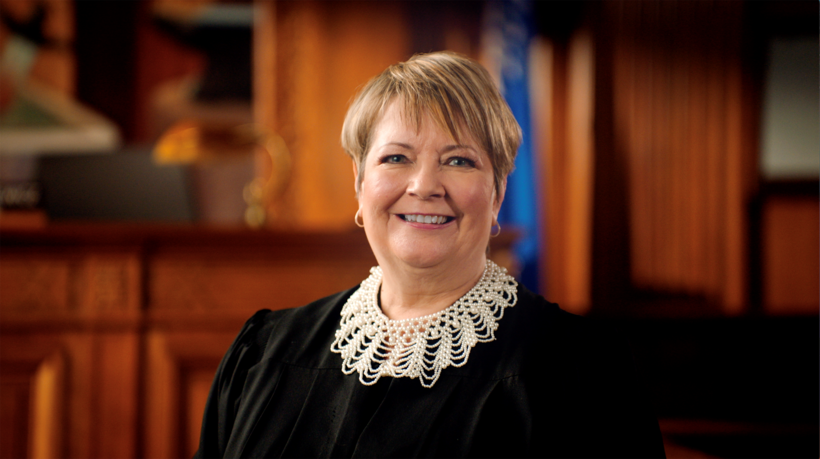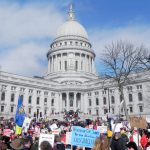Why Protasiewicz Decided Not to Recuse
Her 47-page decision makes strong argument against any justice recusing.
It was an historic exchange.
In a 47-page encyclical, Supreme Court Justice Janet Protasiewicz refused to withdraw from a lawsuit challenging Assembly and Senate district boundaries Republicans drew in 2021. She insisted her pre-election comments – calling those boundaries “rigged” and “unfair” – does not foretell how she will rule in the case.
Responding, Assembly Speaker Robin Vos vowed, “We think the United States Supreme Court precedent compels her recusal, and the United States Supreme Court will have the last word here.”
It was the first time Vos said Republicans will take their fight to disqualify Protasiewicz from the suit to the nation’s highest court.
Vos didn’t immediately repeat his threat to have the Assembly impeach Protasiewicz, which would remove her from court deliberations. But, late last week, Vos said impeachment was still an option, although two retired Supreme Court justices he asked to advise him have said it is not justified.
Two months after joining the Court, Protasiewicz issued her first decision, on why she will not recuse. It cited the cash that partisan and special interests spend on Supreme Court elections, quoted current and retired justices on recusal requests, noted that the Judicial Commission dismissed complaints against her and reminded everyone of her “landslide” 11 percentage point win over former Justice Daniel Kelly in April.
“I have considered all of the facts and legal authorities presented for and against recusal,” Protasiewicz concluded. “I can, in fact and appearance, act in an impartial manner.”
Although legislators said Protasiewicz must step away from the redistricting suit because of her campaign comments and the Democratic Party of Wisconsin spent $9.9 million to elect her, the justice said partisan groups have spent heavily on winning Supreme Court elections since 2016.
Third-party spending cited by Protasiewicz:
“In 2016, the Wisconsin Alliance for Reform spent $2.6 million supporting Justice Rebecca Grassl Bradley‘s campaign (comprising 46.2% of total spending in that election).”
“In 2018, Greater Wisconsin Committee spent $940,000 supporting Justice Rebecca Dallet‘s campaign (comprising 17% of total spending in that election).”
“In 2019, the Republican State Leadership Committee spent $1.25 million supporting Justice Brian Hagedorn‘s campaign (comprising 15.2% of total spending in that election)…[and] 73% of his committee spending).”
“In 2020, A Better Wisconsin Together Political Fund spent $1.88 million supporting Justice Jill Karofsky‘s campaign (comprising 18.8% of total spending in that election).”
Protasiewicz said spending by candidates and third-party groups totaled at least a record $51 million in her election, so the Democrats’ $9.9 million spent was “only 19.4% of total spending.”
“This trend is likely to continue,” Protasiewicz added. Justice Ann Walsh Bradley has said she plans to seek a fourth term in 2025.
Protasiewicz also said the Democratic Party did not file the new suit that she and three other justices – Walsh Bradley, Karofsky and Dallet – voted to accept. Conservative justices – Chief Justice Annette Ziegler, Rebecca Grassl Bradley and Brian Hagedorn – voted to not hear the new challenge to legislative districts.
Protasiewicz also noted how current and past justices have vigorously resisted calls for recusal.
She quoted retired Justice David Prosser, who wrote that “Successful recusal motions alter the composition of the .. Court, so that, in a very real sense, a party moving for a justice’s recusal is trying to change the composition of the court that will hear its case.”
Protasiewicz also quoted Hagedorn, who said this: “We have seen bias and recusal allegations increase greatly in recent years, turning the obligation of adjudicator impartiality into a litigation weapon.”
Protasiewicz also quoted Ziegler, who dismissed the appeal of a criminal conviction from a lawyer who argued that former Justice Michael Gableman should recuse because of his bias against criminal defendants.
“‘[J]udge shopping damages this court as an institution, inappropriately politicizes the court, and nullifies the votes of the electorate,” Ziegler wrote.
Protasiewicz also said the Supreme Court would “grind to a halt” if justices withdrew from cases whenever questions were raised about “non-party groups who supported their campaign.”
“We would be flooded with requests for ‘conservative’ or ‘liberal’ justices to recuse whenever a case involves issues of great social or political importance to any major campaign funder,” she added.
But Justice Grassl Bradley joined Vos in condemning Protasiewicz’s decision to help decide the redistricting suit. “The probability of actual bias on Protasiewicz’s part likely approaches 100%,” she said.
A 2016 campaign brochure picture showed Grassl Bradley in blaze orange and holding a shotgun. By Protasiewicz’s standard, that picture did not promise gun owners and hunters how Grassl Bradley would rule on 2nd Amendment issues. No doubt Grassl Bradley would make the same claim.
Meanwhile, there is no Supreme Court standard on recusals and justices don’t have to offer any explanation when they do withdraw from a case.
Steven Walters started covering the Capitol in 1988. Contact him at stevenscotwalters@gmail.com
If you think stories like this are important, become a member of Urban Milwaukee and help support real, independent journalism. Plus you get some cool added benefits.
The State of Politics
-
RNC Brings Fame to Gen Z Party Leader
 Jul 15th, 2024 by Steven Walters
Jul 15th, 2024 by Steven Walters
-
Wisconsin’s Republican Roots Run Deep
 Jul 8th, 2024 by Steven Walters
Jul 8th, 2024 by Steven Walters
-
Feuding Supreme Court Justices Need a Break
 Jul 1st, 2024 by Steven Walters
Jul 1st, 2024 by Steven Walters






















